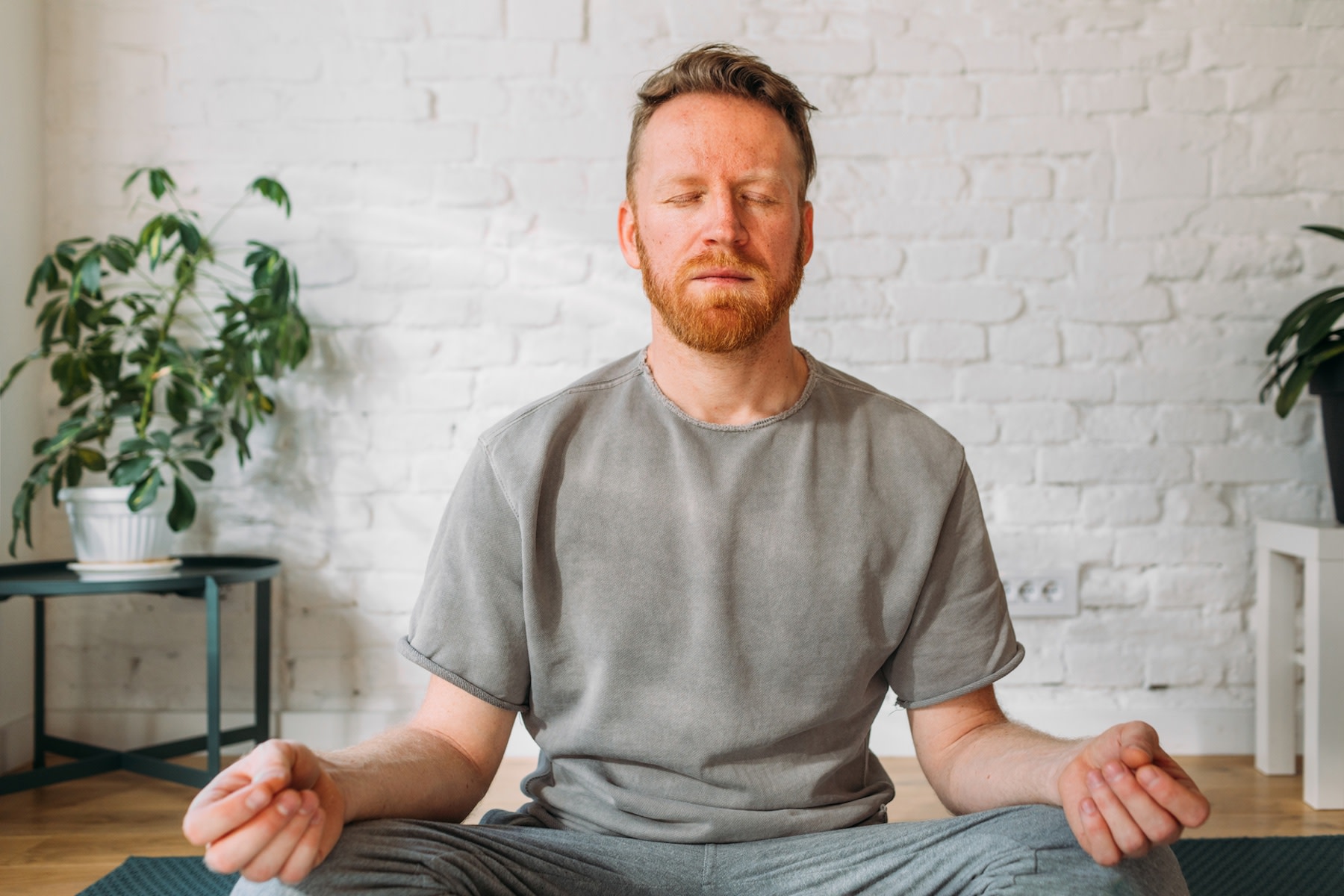
© Studio Firma / Stocksy United
Meditation Is an Easy and Effective Stress Reliever. Here Are 7 Tips for Getting Started
Meditating is one of the most accessible ways to cope with high stress levels and achieve a sense of calm, experts say. Here’s how to get started.
By Kathleen Felton•
What Causes Stress?
How Meditation Relieves Stress
How to Meditate for Stress
When to Talk to Your Healthcare Provider About Stress
The Takeaway
It may get a bad rap, but stress is a natural human response to difficult situations. In fact, a little stress can play a healthy and essential role in your life by helping you learn how to address challenges, notes the World Health Organization (WHO). “Stress is often a natural part of growth,” says Chloe Carmichael, PhD, a clinical psychologist and author of the book Nervous Energy: Harness the Power of Your Anxiety.
Discover more ways to reach your goals with Peloton
But while stress is natural, too much can negatively impact your mind and body. In the American Psychological Association’s (APA) most recent survey on stress in the US, 24 percent of respondents said their stress levels were too high. Those with high stress had a greater likelihood of engaging in unhealthy responses to stress, such as having road rage, lost patience, canceled social plans, and verbal or even physical altercations.
Luckily, there are steps you can take to manage your stress levels—and one of the simplest can be done anytime, anywhere, with absolutely no gear or experience required. Below, learn how meditation can help you relax and unwind, plus find expert tips to get started with meditation for stress.
What Causes Stress?
Even though we all experience some form of stress from time to time, causes can vary tremendously from person to person. According to the APA’s 2023 survey, some of the top culprits for stress in the US include physical and mental health problems (or health conditions affecting family members), the economy, money, family responsibilities, housing, relationships, and job stability.
Some sources of stress are completely out of our control, while others can be managed more easily. For instance, “some people are stressed because they habitually overload their lives with more work than could possibly be done,” Carmichael says. “Some of them also struggle with guilt because they feel they are constantly disappointing people.”
Even happy situations can bring on stress. Positive life moments such as marriage or a promotion, for example, can be accompanied by something called eustress or beneficial stress, Carmichael says. “Sometimes the highs of life can feel overwhelming,” she explains. “People [can] experience a crash afterward, or they get [negative comments from] society about the responsibilities associated with their newfound marriage, promotion, or other positive life events such as having a child.”
And of course, it’s no secret that we’re living in a stressful world right now. “There are a lot of crosscurrents at the moment that seem to be making this a particularly stressful time in history,” says Peloton instructor Ross Rayburn. “It definitely manifests in fear about the future.”
Chronic stress is linked to a higher risk of sleep problems, anxiety, depression, headaches, and even more serious conditions such as heart disease—all reasons why it’s so important to take steps to manage high stress levels.
How Meditation Relieves Stress
Research has linked mindfulness-based therapies such as meditation to reduced stress levels, as well as lower rates of anxiety, depression, pain, and addiction. There are benefits for your physical health, too: Studies suggest that mindfulness techniques may also help improve pain and fatigue in people with chronic pain, and possibly even boost your immune system.
Meditation offers a number of stress-reducing benefits, but one of its biggest advantages is its ability to help you focus your attention on the challenges at hand, Carmichael says. “Meditation can help increase awareness for people who need to understand more about why they are overstressed,” she explains. “Developing insight about why we are overstressed can empower us to make changes.”
What’s more, meditation can also help you learn how to physiologically calm down in the moment, Carmichael says, and in some cases, this can have a hugely positive impact on your stress. “This is particularly true for people who get anxious over physiological symptoms of stress easily, or who are just prone to express stress physiologically,” she says.
Over time, meditating may also help you learn new skills that enable you to better manage the sources of your stress so it doesn’t become quite as overwhelming. Guided imagery meditations can be particularly helpful for this, Carmichael notes. “For example, someone might have practiced mindfulness meditation to develop insight that a chaotic relationship was the source of their stress, and then used a guided imagery meditation to mentally rehearse asserting stronger boundaries with their partner,” she explains.
Despite all these benefits, meditation isn’t always immediately peaceful, Ross notes—for example, sometimes when you first close your eyes, stress seems to amplify—but with consistent practice, stressors can become easier to manage. “[Meditation] doesn’t negate or remove [stress],” he says. “But it provides a tiny bit of distance, small and large—either we sense some relief or we plant some seeds that eventually blossom into calm.”
Related Articles

Meditation
New to Meditation? Here’s How to Form a Beginner-Friendly Practice That Sticks

Mental Health
Why Exercise Is So Powerful at Reducing Stress, According to Science

Meditation
6 Reasons Why Meditation Can Be Incredibly Effective at Easing Anxiety

Meditation
8 Meditation Tips to Help You Feel Even More Comfortable with Your Practice
How to Meditate for Stress
Ready to try meditation for stress, but unsure where to start? Here are a few pointers to help you get going:
1. First, Know That You Can’t “Do It Wrong”
Many people assume there’s a “right” way to meditate, or perhaps that they need perfect conditions—calming music, a meditation pillow, 30 uninterrupted minutes—in order to do it successfully. But Ross insists that meditation cannot be done incorrectly. “The only way to possibly get close to doing it wrong is to tell yourself you’re doing it wrong,” he says. “Just the intention to meditate is a step in the right direction.”
2. Start By Taking a Few Deep Breaths
While it’s wonderful if you’re able to dedicate 10, 20, or 30 or more minutes a day to your meditation practice, it isn’t always possible. Plus, the thought that you have to carve out a certain amount of time to meditate can be intimidating—and stressing about finding time to meditate is a surefire way to continue feeling stressed.
Instead, Ross recommends short mindful moments: “Sometimes it’s as simple as just taking three deep breaths,” he says. Consciously try to incorporate more deep breathing throughout your day (think: when you’re driving, before brushing your teeth, or while chopping veggies for dinner) or by making an effort to pause more intentionally before speaking. Over time, these moments of intention and awareness will help to increase feelings of calm.
3. Accept Every Meditation for What It Is
When you imagine yourself meditating, maybe you’re sitting cross-legged on a pillow in a calm, quiet room with a gentle breeze blowing through an open window. Meditation might look like that for you—or it might not! No matter what your practice looks like, don’t let an idealized vision of it prevent you from appreciating whatever experience you wind up having. “There’s such a trap in setting up the ideal,” Ross says. “It leads us to fall short.” Instead, “give yourself permission for [your meditation] to be anything,” he says.
4. Get Cozy
Again, there’s no right or wrong way to meditate, but making yourself comfortable can certainly help you feel more relaxed and open. Some people like to place a favorite picture in front of them or light a candle, Ross notes, while others find props and pillows helpful. If your body is tense, do a quick stretch first. “Discomfort will always draw your attention away from turning inward,” he says.
5. Remember That Racing Thoughts Are OK
Ross says one of the biggest misconceptions about meditation is that you have to try to “stop your thoughts” in order to enter a truly meditative state. But thoughts are meant to come and go—so if you find yourself thinking of your kids, your work, or your dinner plans while meditating, accept them rather than fight them. “We have the capacity to observe [our thoughts] and learn to get distance from them, and sometimes it’s fleeting,” Ross says. “But the biggest mistake is trying to be still instead of simply creating an environment in which stillness can arise.”
6. Set Goals If It Helps (But Know You Don’t Have To)
Some people thrive on routine. If that’s the case for you, you might tell yourself that you’re going to aim to meditate a certain number of times per week (say, every other day for 10 minutes). Just be willing to adjust or let go of your goals if they’re not working for you. (This is especially important with meditation for stress, since guilt over not sticking to a routine can have the opposite effect on stress levels.)
7. Give Yourself Credit for Showing Up
Maybe you spent 20 minutes in a blissful meditative state, or perhaps you only had time for a few big breaths at your desk. Either way, count it a success. “We always have meditations that are more enjoyable than others, and you’ll always have days when meditation will be frustrating,” Ross says. “But honor the experience no matter what, and see if you can tap into a sense of gratitude that you had the intention, the space, and the time to even try [to meditate].”
When to Talk to Your Healthcare Provider About Stress
Any level of stress is worth speaking to your doctor about, and far too many people don’t get the help they need when they’re feeling overwhelmed. In the APA survey, the majority of respondents (66 percent) said they could use more emotional support for stress.
While you should absolutely feel empowered to talk to your health care practitioner about stress even if you’re not experiencing red-flag warning signs, Carmichael says seeking care is especially important if you’re noticing any of the following:
You have been struggling to sleep for more than a week
You’re experiencing noticeable changes in appetite
Your mood swings feel out of control
Your doctor will give you a physical examination, ask about the symptoms you’re experiencing, and rule out any underlying conditions that may be contributing to your stress. They may also recommend you speak to a therapist, which can be particularly beneficial for stress. Cognitive behavioral therapy has been found to help people better cope with stress, as well as manage conditions like depression and anxiety.
In her practice, Carmichael works with patients to help them learn strategies to cope with the symptoms of stress as well as address the actual source of their worries. “For example, someone who is jittery about an upcoming job interview can shift from learning breathing techniques for their jitters towards learning how to channel their energy into laser focus that will help get the job,” she says.
The Takeaway
Stress can have a detrimental effect on both your mind and body, and meditation for stress is an accessible tool that anyone can use to ease tension. With practice, experts say, meditation can help you strengthen your ability to manage stress and respond better to situations that trigger it.
Most importantly, remember that there’s no right or wrong way to meditate. If you’re meditating to reduce stress, Ross suggests making note of how your stress levels feel over time. “It’s almost like you’re stringing together a necklace,” he says. “You’re stringing one pearl, and another, and eventually you look down and you’ve created a tapestry of experience and integrity.”
And remember, there are countless guided meditations you can explore on the Peloton App to find what works best for you, with classes ranging from five to 30 minutes that focus on everything from relaxation to gratitude to healing.

Peloton App
Access thousands of classes with no equipment needed.
This content is for informational and educational purposes only and does not constitute individualized advice. It is not intended to replace professional medical evaluation, diagnosis, or treatment. Seek the advice of your physician for questions you may have regarding your health or a medical condition. If you are having a medical emergency, call your physician or 911 immediately.
This content is for informational and educational purposes only and does not constitute individualized advice. It is not intended to replace professional medical evaluation, diagnosis, or treatment. Seek the advice of your physician for questions you may have regarding your health or a medical condition. If you are having a medical emergency, call your physician or 911 immediately.
Strengthen your mind-body connection
Enter your email to get articles, expert-backed tips, and updates from Peloton sent to your inbox.
By providing your email address, you agree to receive marketing communications from Peloton.
For more about how we use your information, see our Privacy Policy.










